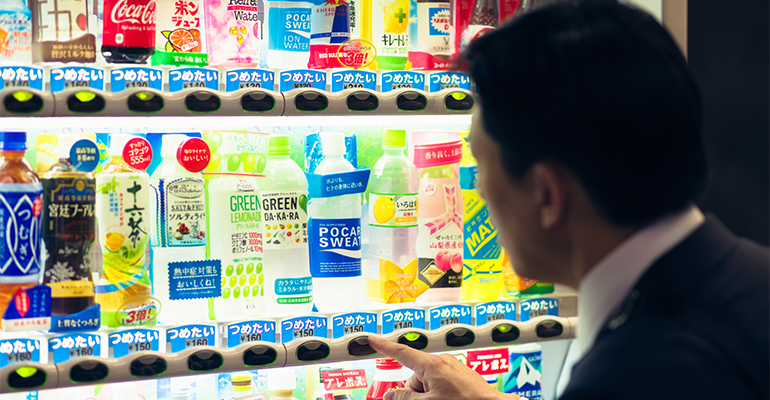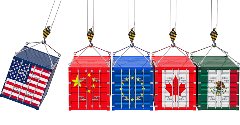News
Umami Cola shakes up soda drink category with unique flavour
18 Nov 2024Japan’s Umami Cola is aiming to transform soft drinks with its koji-sweetened, botanical-based soda that taps into the trend for fermented food and drink and natural energy.

Japan-based Umami Cola positions itself as a natural energy drink, seeking to meet consumer demands by creating a koji-sweetened, botanical-based beverage formulation and novel inverted can design.
Launched in 2020, the non-alcoholic, non-caffeinated, additive-free, fresh cola carbonated drink is marketed based on the ‘koji amazake’ concept, a non-alcoholic, fermented Japanese drink made from rice koji and steamed rice. Comparing ‘koji amazake’ to a drinkable IV drip, Umami Cola targets on-the-go consumers looking for better-for-you beverages with its nutrient-rich rice malt drink.
Amazake contains limited ingredients, only rice koji and water. Umami Cola formulates its Amazake drink with sweet koji. Using steamed rice, the brand makes its craft cola by adding koji mould to its rice malt. The ingredients then undergo fermentation to turn them into sweet koji. The resulting product’s sweetness comes from the rice’s remaining starch, avoiding any additional sugar.
The brand named the product ‘Umami’ because koji amazake contains glutamic acid, which gives the product its umami taste. Incorporating Umami in the title, the brand aims to share Japan’s unique fermented food culture through a familiar drink.
With a modern twist
Bringing together classic Japanese brewing processes that appeal to contemporary consumer demands, Umami Cola says its newly launched craft cola is the first additive-free raw craft cola in a can. Marketed as a natural energy drink, it is geared towards busy consumers on-the-go looking for an energy lift in the morning.
Designed to offer a healthier alternative to typical energy drinks, Umami Cola is low in calories at 40 calories per 100 mg. It states it contains over 350 types of nutrients, including a wide range of B vitamins and the nine essential amino acids.
Umami Cola is available in medium (250 ml) and large (720 ml) sizes. Both are non-alcoholic, non-caffeinated, additive-free raw craft cola syrups that need to be diluted to create the brand’s cola. The brand's medium variety can be diluted four times to create four to seven cups of cola, while its large version can also be diluted four times to produce eleven to 20 cups.
The brand's Meimetsu variety is a craft cola made using caramelised syrup. The syrup is created using orangettes, a sweet treat. Described as having a distinctive osmanthus scent, the caramelised syrup has a unique flavour and non-spice-based scents reminiscent of flowers, trees, and leaves.
At the Topawards Asia 2024, an Asia-only packaging design award ceremony, Umami Cola’s packaging design was celebrated for its novel design that highlights its ingredients while incorporating a modern sensibility.
Umami Cola selected the key colour pink to represent the brand’s complex and unique liquid colour. The product's design is printed upside down. The idea to do this was a functional one, as when consumed, it indicates the product’s ingredients have settled, prompting consumers to invert the can.
Cola and umami: From Japan to the rest of the world
In recent years, cola has become the most popular carbonated soft drink in Japan. According to Statista, almost 40% of respondents named cola their favourite carbonate drink as of August 2021. The growing preference for a sober curious lifestyle is contributing to the rise in consumer interest in soft drinks. In a survey on consumer drinking habits by Asahi Group, out of 10,000 men and women in Japan, 45% said they do not drink alcohol.
According to market intelligence provider Mintel estimates, five years ago, carbonated soft drinks stagnated in Japan due to significant shifts in consumer attitudes and consumption choices resulting from growing health awareness. Mintel’s research suggested that welcoming new flavours may be a viable strategy for soft drink manufacturers. New, unusual flavours, combinations and limited-edition offers were raised as a way to appeal to the younger generation of consumers in Japan.
Today, due to extensive consumer demand and craft varieties, Umami Cola is up against tough competition from other leading Japanese brands, including Iyoshi Cola, Toba Toba Cola, Izumo Spice Lab, Tomo Cola and Spring Water Kihada Cola. Umami Cola hopes its unique formulation and packaging will help it stand out on physical and online shelves.
Back in May 2024, Ingredients Network explored how Japanese-inspired umami products were expanding into global consumer markets. Japan’s Umami Information Center attributed this to the rising worldwide interest in the Japanese food Washoku, which was led by growing health and environmental awareness.
An Innova study found that a third of global consumers are intrigued by new, unique and different flavours. In addition, one in four global consumers is attracted to exciting and exotic global flavour combinations. Manufacturers interest in the flavour umami comes as a result of these calls for exciting flavour profiles.
According to Innova, “savouring the contrast” is one of the top five global flavour trends and a significant theme for umami development in 2024. As one of the five basic tastes, umami is crucial for manufacturers in crafting flavours for new food products.
Related news

Future F&B flavours favour exploration and explosive taste profiles
25 Mar 2025
Exploration and experimentation will define the future of flavour, according to Mintel, as consumers seek out taste profiles and textures that offer an adventurous eating experience.
Read more
Partnership plans to scale cultivated meat production
21 Mar 2025
Food technology innovator Ever After Foods (EAF) and multinational food leader Bühler are striving to overcome hurdles to access and accelerate the development of cultivated meat.
Read more
Global consumers enjoy food less and perceive it as less healthy
20 Mar 2025
Enjoyment of food and its perceived healthiness is dwindling among most global populations, according to findings from Gallup and Ando Foundation/Nissin Food Products.
Read more
Seafood set to ‘dethrone’ poultry as protein growth king
19 Mar 2025
Seafood is poised to surpass poultry as the leading contributor to global protein supply growth this year, according to Rabobank’s latest protein outlook.
Read more
Tariff volatility leaves food manufacturers in limbo
11 Mar 2025
Rapid US trade policy shifts and tariff escalations are creating uncertainty for food manufacturers and ingredient suppliers.
Read more
F&B industry hit with fresh greenwashing claims
26 Feb 2025
The food and beverage (F&B) industry is under fresh scrutiny amid claims of greenwashing, with Arla the latest company in the firing line.
Read more
Protein diversification: A massive missed market?
20 Feb 2025
Germany and the UK could be missing out on the massive market for alternative meats and proteins, with one new coalition calling for an end to the “steak-tofu struggle”.
Read more
Have scientists discovered a new tool to measure UPFs?
19 Feb 2025
Researchers have developed a new scoring system and database, compiling over 50,000 food items, of which over 1,000 are classified as ultra-processed.
Read more
China ramps up cultivated meat research with new innovation base
18 Feb 2025
China has opened its first fermentation and cultivated meat research centre in Beijing.
Read more
Most consumers lack trust in AI, but supplement users are ready to embrace the technology
14 Feb 2025
A survey of UK and US consumers found that most supplement users are willing to let AI make decisions on their behalf, but they also demand greater transparency.
Read more